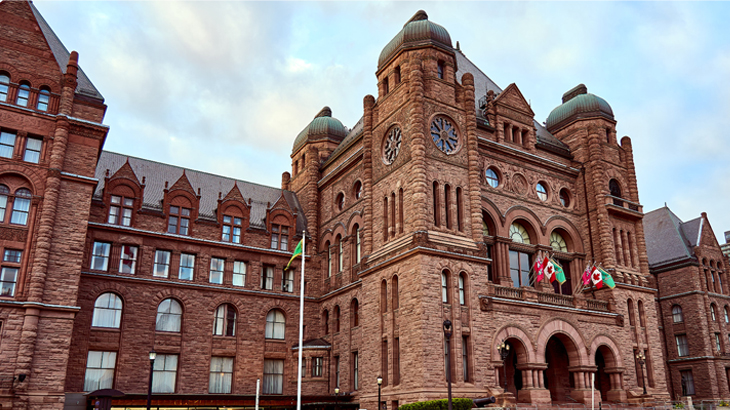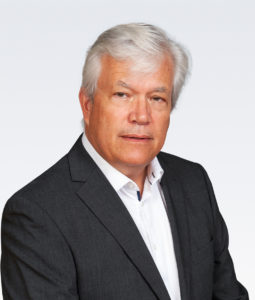The Ontario Legislative Assembly rose for the annual summer break on Thursday, June 8, after a period of protracted debate and legislative activity in the final weeks of the sitting.
As outlined in Budget 2023, the provincial government finds itself with a better-than-expected fiscal position, with a path to budgetary balance by 2026 a deficit reduced to $2.2 billion in 2022-23, more than $15 billion less than anticipated in the 2022 budget.
Premier Doug Ford and his Ontario PC Party go back to their constituencies for the summer BBQ circuit with a comfortable lead in the polls but face increasing headwinds on the policy front as healthcare, housing and manufacturing continue to make headlines.

Government priorities
Housing and affordability
Ontario’s Bill 97: Helping Homebuyers, Protecting Tenants Act, 2023, was originally introduced at first reading after the tabling of the recent budget. The government moved closure on the bill to ensure that it would reach third reading vote in time for the end of the spring sitting and it received Royal Assent on June 9, after passing third reading earlier in the week. This bill allows municipalities to expand their settlement boundaries and build on undeveloped land more quickly. It also waters down some of the Liberal-era density targets, except near transit stations and in downtowns, where municipalities will be required to build up.
As Ontario residents continue to feel the pinch of limited housing supply and a rising cost of living, the government’s response so far appears to fall short of its own expectations. The plan has also drawn sharp criticism from farmers across the province, who argue the proposed changes to residential development rules in rural areas and the green belt put an already shrinking stock of viable farmland at risk.
Public safety
Also receiving Royal Assent on the final day of the sitting was Bill 102: Strengthening Safety and Modernizing Justice Act, 2023. This bill was tabled in response to a growing demand for more resources for municipal police services and the Ontario Provincial Police to respond to emergencies.
The legislation makes tuition free at the Ontario Police College and scraps a proposal that all officers hold a post-secondary degree or diploma as a requirement for employment with a municipal or provincial police service.
Red tape reduction and jobs
Also receiving Royal Assent in the final days of the spring sitting was Bill 91: Less Red Tape, Stronger Economy Act, 2023. This bill makes 42 legislative changes to streamline regulations in a variety of sectors including industrial development and immigration. Once fully implemented, the government estimates to save businesses, nor-for-profits and the public sector $119 million in annual costs.
The legislation changes regulatory requirements to allow for carbon capture facilities to be tested on private lands in the province to encourage the start-up and development of these facilities, which are also the target of federal incentives.
Critical minerals and the Ring of Fire
In May, the legislature passed the controversial Bill 71: Building More Mines Act, 2023, as a key part of the government’s plans to develop the Ring of Fire in northern Ontario. It has faced stern opposition from nearly every First Nations community in the province, and the opposition parties, for its changes to the consultation and approval requirements for mines and mine closure planning. As passed, the bill removes the roles of the Director of Mines and Director of Rehabilitation from the approvals process and moves their authority to determine if First Nations have been adequately consulted on a mining project directly to the responsible minister.
The bill also changes the standard for recovery of minerals from mine tailings and waste. Previously, a project needed to “improve” the land from a public health or environment perspective, but the bill changes the standard for mining proponents to leave a mine in a state that is “comparable to or better than” before the activity.
Healthcare
Since the height of the pandemic in 2020 and 2021, Premier Ford and the Ontario PCs have faced strong opposition at every level on its healthcare strategy. In recent months, the lengthy wait times are emergency rooms and urgent care facilities have increased demands for greater access to private surgery and specialized clinics.
In response to these demands, the government passed Bill 60: Your Health Act, 2023, in May to allow community and private clinics to offer certain surgeries and procedures under the publicly-funded umbrella in an effort to reduce wait times and clear congestion at hospitals. The government is starting with expanding options for cataract surgeries and diagnostic imaging and testing, as well as hip and knee procedures. This process for expanding the number of procedures able to be done at private and community clinics is expected to be rolled out in multiple phases, with more plans coming in the fall.
Looking ahead
EV and battery manufacturing
In May, German automotive giant Volkswagen and its new electric vehicle battery company PowerCo., selected St. Thomas, Ontario, as the location for its first gigafactory outside of Europe. Once operational, the facility will directly create 3,000 jobs in the southwestern Ontario community and more than 30,000 indirect jobs down the supply chain. The federal and provincial governments hailed the announcement, with much fanfare, as proof of their commitments to the next generation of automotive manufacturing in Canada and Ontario, but it came at a high cost.
To secure the deal over other potential locations in the United States and Mexico, the federal government handed VW $700 million and Ontario pitched in another $500 million in up-front capital costs towards the $7 billion facility. The government of Canada also offered between $8 billion and $13 billion more in production subsidies to be paid out once batteries are made and sold to counterbalance the incentives offered by the U.S. federal government in its Inflation Reduction Act. The production subsidies though, are not tax credits and will disappear or reduce if the programs under the U.S. IRA are eliminated or reduced as well.
Ontario Liberal leadership race
The race for the Ontario Liberal Leadership is now officially underway, with multiple candidates already hitting the hustings to generate support. Kingston and the Islands MPP Ted Hsu is so far competing against federal MPs Nathaniel Erkskine Smith from Toronto and Ottawa Centre MP Yasir Naqvi for the job, with other candidates expected to register in the coming weeks, including Mississauga Mayor Bonnie Crombie. The party will choose its new leader on December 2.
The outcome of the outcome will have significant impacts on dynamics at Queen’s Park. Not only for the PCs, but for the NDP as the Liberal leader will want to reclaim some ground lost since the 2018 provincial election.
Public transit
The Ontario government is facing continuing pressure over ongoing delays and significant cost overruns of the Eglinton Crosstown project in Toronto. Crosslinx, the group contracted to build the line, is now threatening to stop work on the project and sue the Ontario government. This has put Transportation Minister Caroline Mulroney, Metrolinx CEO Phil Verster, and Premier Ford under additional public pressure as costs increase. Other public transit projects across the province face similar issues, including in Ottawa.
Online gambling
The Alcohol and Gaming Commission of Ontario (AGCO) just closed consultations on banning the use of celebrities in online gambling and sports betting advertisements. This has become a massive issue during the NHL playoffs, where the celebrity endorsement and ads seem ever present. A number of advocacy groups have recently called to ban online gambling and sports betting ads completely, including the group Ban Ads for Gambling which has received a public endorsement from Karl Subban, father of retired NHL all-star PK Subban. In the final week of the spring sitting, the NDP introduced Bill 126: Ban iGaming Advertising Act, 2023.
While the bill is unlikely to be made into law, it draws attention to the mounting support for greater regulations around gambling ads. It’s unclear how far the AGCO will go, but the Ford government has in the past demonstrated it can be moved by public opinion, so will be interesting to see what ultimately results from the consultations.











